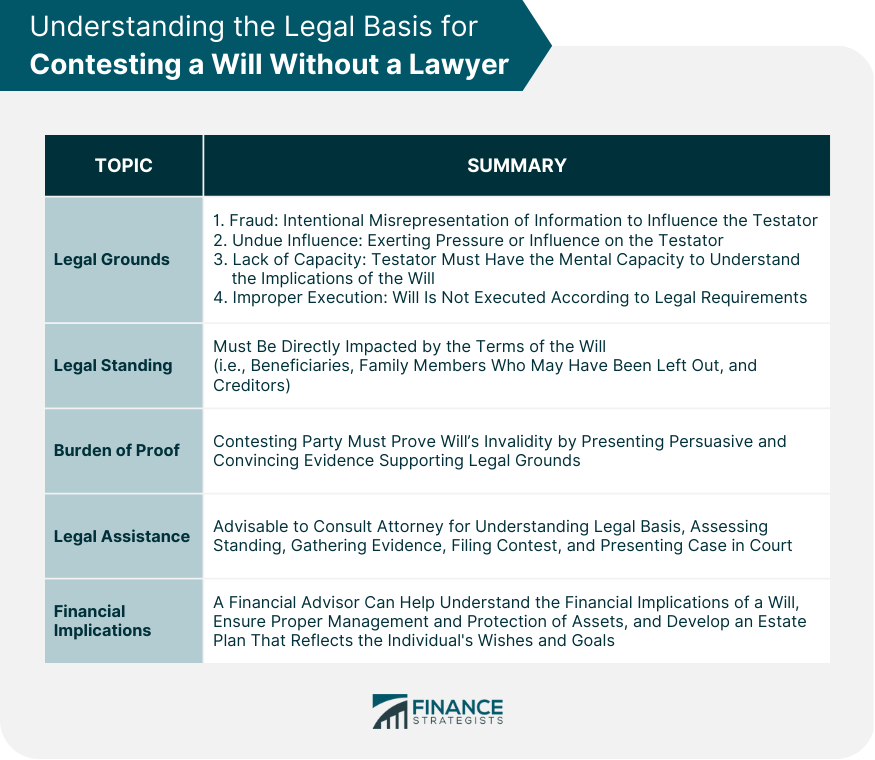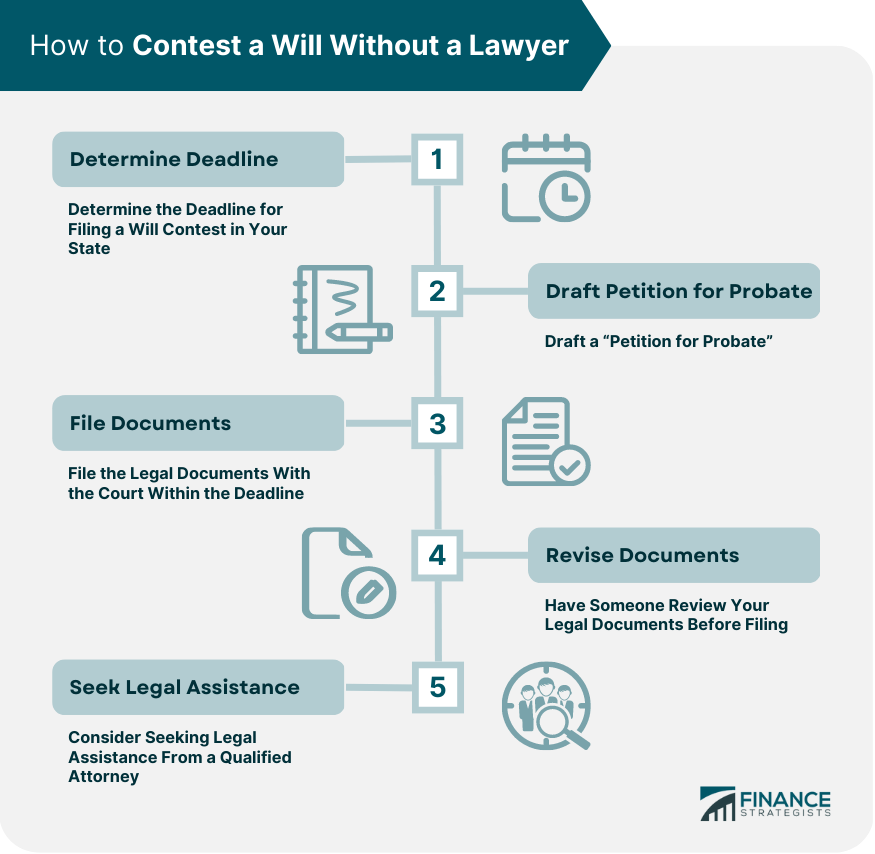Below are the legal basis for contesting a will: In general, there are several legal grounds for contesting a will, including fraud, undue influence, lack of capacity, and improper execution. Fraud occurs when someone intentionally misrepresents information to influence the testator (the person who made the will) to create or change the terms of the will. Undue influence occurs when someone exerts pressure or influence on the testator to create or modify the terms of the will. Lack of capacity refers to situations where the testator needs to have the mental capacity to understand the implications of the will. Improper execution occurs when the will is not executed according to the legal requirements in the state where it was created. To determine if you have legal standing to contest a will, you must be a person who is directly impacted by the terms of the will. This includes beneficiaries who have been named in the will and family members who may have been left out of the will. In some cases, creditors may also have legal standing to contest a will. Understanding the burden of proof required in a will contest is also important. In general, the person who is contesting the will has the burden of proving that the will is invalid. This requires presenting evidence that supports the legal grounds for contesting the will. The evidence must be persuasive and convincing enough to demonstrate to the court that the will is invalid. While it is possible to contest a will without a lawyer, it is always advisable to seek the guidance of a qualified attorney before taking any legal action. A lawyer can help you understand the legal basis for contesting a will, assess your legal standing to contest a will, and guide you through gathering evidence, filing a will contest, and presenting your case in court. In addition to legal considerations, it is also essential to understand the financial implications of a will. A financial advisor can provide valuable assistance in understanding the financial implications of a will and ensuring that your assets are properly managed and protected. A financial advisor can also help you to develop an estate plan that reflects your wishes and goals for your assets. If you decide to contest a will without a lawyer, it is important to understand the procedural requirements for filing a will contest. This typically involves filing a petition with the court with jurisdiction over the will. The petition should include a detailed explanation of why you believe the will is invalid and any evidence supporting your case. Tips for drafting and filing legal documents include being clear and concise, using appropriate legal language, and following the court's procedural requirements. You may also want someone to review your documents before you file them to ensure they are complete and accurately reflect your position. In addition to understanding the legal grounds for contesting a will, it is important to familiarize yourself with the procedural requirements for a will contest. This includes understanding the deadlines for filing a will contest, the rules for serving notice on interested parties, and the requirements for presenting evidence in court. Following all of the court's procedural rules and requirements is also important. Failure to do so can result in your case being dismissed or your evidence being excluded from consideration. While it is possible to file a will contest without a lawyer, it is always advisable to seek the guidance of a qualified attorney before taking any legal action. A lawyer can help you understand the procedural requirements for a will contest and provide valuable assistance in drafting and filing legal documents. If you are considering contesting a will without a lawyer and are unsure whether you have the knowledge or experience to do so effectively, it may be in your best interest to seek legal assistance. Preparing for court appearances without a lawyer can be challenging. There are several strategies you can use to increase your chances of success. Familiarize Yourself With Evidence and Court Procedure Rules. This will help you to understand what evidence is admissible in court and how to present it effectively. Anticipate Cross-Examination Questions and Prepare Concise, Accurate Answers Supported by Evidence. This means anticipating the questions that the other side may ask and preparing answers that are concise, accurate, and supported by evidence. Present Yourself Professionally and Respectfully, Including Dressing Appropriately and Speaking Clearly and Confidently. This includes dressing appropriately, speaking clearly and confidently, and avoiding any behavior that could be disrespectful to the court or the other side. One of the most important steps in contesting a will without a lawyer is gathering evidence to support your case. This can include documents, such as medical records or financial statements, that show the testator's mental state or financial situation when the will was created. It may also include witness statements from people present when the will was created or who can attest to the testator's state of mind. Once you have gathered evidence, organizing it clearly and persuasively is important. This can include creating a timeline or summarizing key facts supporting your case. You should also be prepared to explain how each piece of evidence supports the legal grounds for contesting the will. Strategies for presenting your case in court without legal representation include being prepared, concise, and confident. You should be prepared to explain the legal grounds for contesting the will and how each piece of evidence supports your case. It is important to be concise and avoid rambling or repeating yourself. Finally, you should be confident in your presentation and avoid appearing nervous or uncertain. Contesting a will without a lawyer requires a thorough understanding of the legal basis for challenging a will, gathering evidence, and presenting a persuasive case in court. While it is possible to contest a will on your own, it is always advisable to seek the guidance of a qualified estate planning lawyer before taking any legal action. An estate planning lawyer can also provide valuable assistance in understanding the financial implications of a will and ensuring that your assets are properly managed and protected.Understanding the Legal Basis for Contesting a Will Without a Lawyer
Legal Grounds for Contesting a Will
Legal Standing to Contest a Will
Burden of Proof in a Will Contest
Legal Assistance
Financial Implications of a Will

Contesting a Will Without a Lawyer

Filing a Petition
Drafting and Filing Legal Documents
Understanding the Procedural Requirements for a Will Contest
Seeking Legal Assistance if Needed
Preparing for Court Without a Lawyer
Gathering Evidence and Building a Case Without a Lawyer
Final Thoughts
How to Contest a Will Without a Lawyer FAQs
Contesting a will without a lawyer means challenging the validity of a will in a court of law without the assistance of a legal professional.
Some legal grounds for contesting a will include fraud, undue influence, lack of capacity, and improper execution.
To contest a will without a lawyer, you must gather evidence supporting the legal grounds for contesting the will. This can include documents, such as medical records or financial statements, as well as witness statements.
Yes, you can file a will contest without a lawyer. Still, it is important to understand the procedural requirements and legal grounds for contesting a will before taking any legal action.
Yes, an estate planning lawyer can provide valuable assistance in understanding the financial implications of a will and ensuring that your assets are properly managed and protected. It is always advisable to consult with a trusted professional before making any significant financial decisions.
True Tamplin is a published author, public speaker, CEO of UpDigital, and founder of Finance Strategists.
True is a Certified Educator in Personal Finance (CEPF®), author of The Handy Financial Ratios Guide, a member of the Society for Advancing Business Editing and Writing, contributes to his financial education site, Finance Strategists, and has spoken to various financial communities such as the CFA Institute, as well as university students like his Alma mater, Biola University, where he received a bachelor of science in business and data analytics.
To learn more about True, visit his personal website or view his author profiles on Amazon, Nasdaq and Forbes.











